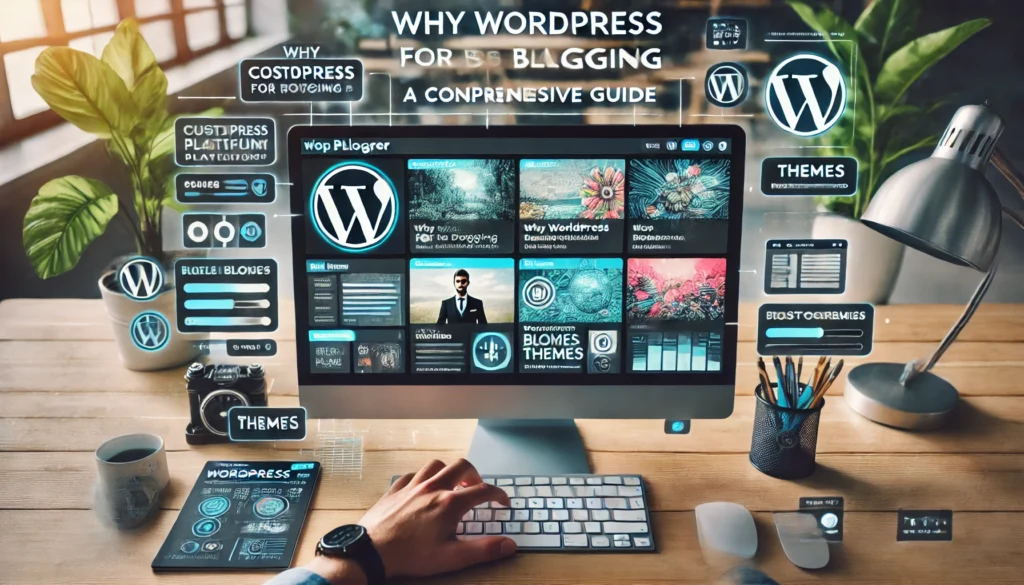







In today’s digital age, blogging has become an incredibly popular way to share information, express creativity, and even earn an income. If you’re thinking about starting a blog, choosing the right platform is critical to your success. WordPress is often hailed as the best platform for blogging, and for good reason. In this guide, we’ll explore why WordPress is the go-to choice for bloggers, how to set up and customize your WordPress blog, and tips for optimizing and monetizing your content.
Understanding the Benefits
WordPress powers over 40% of all websites on the internet, making it the most popular content management system (CMS) in the world. But what makes it the best choice for bloggers?
WordPress offers unparalleled flexibility. With thousands of themes and plugins available, you can customize your blog’s appearance and functionality to suit your specific needs. Whether you want a simple blog or a feature-rich website, WordPress can accommodate your vision.
WordPress is known for its intuitive and user-friendly interface, making it accessible even for beginners. The dashboard is straightforward, and creating posts, pages, and other content is easy and efficient.
Search engine optimization (SEO) is crucial for driving traffic to your blog. WordPress is designed with SEO in mind, offering features like customizable permalinks, meta tags, and easy integration with SEO plugins like Yoast SEO.
WordPress has a vast, active community of developers, designers, and users. This means that if you ever run into a problem or need advice, there are countless resources, forums, and tutorials available to help you out.
Whether you’re starting a small personal blog or planning to grow into a large content site, WordPress can scale with your needs. You can start with a simple setup and add features as your blog grows.
Setting Up Your Blog the Right Way
Starting a WordPress blog is a straightforward process, but there are important decisions to make along the way.
WordPress offers two main platforms: WordPress.org and WordPress.com.
Your domain name and hosting provider are the foundation of your blog. Choose a domain that reflects your brand and a hosting provider that ensures your site runs smoothly. Popular hosting options include Bluehost, SiteGround, and WP Engine.
Making Your Blog Stand Out
Customization is one of WordPress’s strongest features, allowing you to create a blog that truly represents your brand.
Your theme determines the look and feel of your blog. When choosing a theme, consider:
Plugins are tools that add functionality to your WordPress site. Essential plugins for bloggers include:
Content is the heart of your blog. Organize your content effectively by:
Maximizing Your Blog’s Visibility
SEO is essential for driving organic traffic to your blog. WordPress makes it easy to implement SEO best practices.
Optimize each blog post for SEO by:
Images can slow down your site if not optimized. Use plugins like Smush to compress images without losing quality, and always add alt text to improve accessibility and SEO.
SEO plugins like Yoast SEO or Rank Math help you optimize your blog posts by providing real-time suggestions and insights on how to improve your content’s SEO performance.
Turning Your Passion into Profit
Once your blog is up and running, you can explore various monetization strategies.
Affiliate marketing involves promoting products or services and earning a commission for sales made through your referral links. Choose products relevant to your audience and create content that naturally incorporates affiliate links.
Brands may pay you to create content that promotes their products or services. Ensure that sponsored content aligns with your blog’s theme and provides value to your readers.
Joining advertising networks like Google AdSense allows you to display ads on your blog. You earn money when visitors click on these ads. While it’s a straightforward monetization method, it typically requires high traffic to generate significant income.
If you have expertise in a particular area, consider creating and selling digital products such as e-books, online courses, or printables. WordPress makes it easy to set up a store using plugins like WooCommerce.
Navigating the Roadblocks
Blogging can be rewarding, but it comes with its challenges. Here’s how to overcome them:
Building a loyal audience takes time and effort. Focus on creating high-quality content, optimizing for SEO, and promoting your blog on social media to attract readers.
Consistency is key to blogging success. Plan your content in advance with a content calendar, and consider writing posts in batches to stay ahead.
Technical issues can be daunting, especially for beginners. Keep your WordPress installation, themes, and plugins updated, and choose a reliable hosting provider to minimize problems. For more complex issues, consult WordPress forums or hire a professional.
Common Questions About Blogging on WordPress
Is WordPress good for blogging?
Yes, WordPress is one of the best platforms for blogging due to its flexibility, ease of use, and extensive customization options.
What’s the difference between WordPress.org and WordPress.com?
WordPress.org is a self-hosted platform that offers full control over your site, while WordPress.com is a hosted service with various plans and limitations on customization and monetization.
Can I make money blogging on WordPress?
Yes, you can monetize your WordPress blog through methods like affiliate marketing, sponsored content, advertising networks, and selling digital products.
Do I need coding skills to use WordPress?
No, you don’t need coding skills to use WordPress. It’s designed to be user-friendly, and most customization can be done through themes, plugins, and the WordPress dashboard.
What are the essential plugins for a WordPress blog?
Essential plugins for bloggers include Yoast SEO for SEO optimization, Akismet for spam protection, Jetpack for site security and performance, and WPForms for creating contact forms.
How can I improve my blog’s SEO?
You can improve your blog’s SEO by conducting keyword research, optimizing your content and meta tags, using internal linking, and ensuring your site is mobile-friendly and fast.
WordPress is the ultimate platform for blogging, offering the perfect balance of flexibility, user-friendliness, and scalability. Whether you’re a beginner or an experienced blogger, WordPress provides the tools and resources you need to create a successful blog. By following the steps outlined in this guide, you can set up, customize, optimize, and monetize your WordPress blog effectively. Start your blogging journey today and unlock the full potential of WordPress to share your voice with the world.



Ready to take your project to the next level? At Freelanty, we connect you with talented freelancers who bring your vision to life. Contact us today and discover how we can help you succeed.